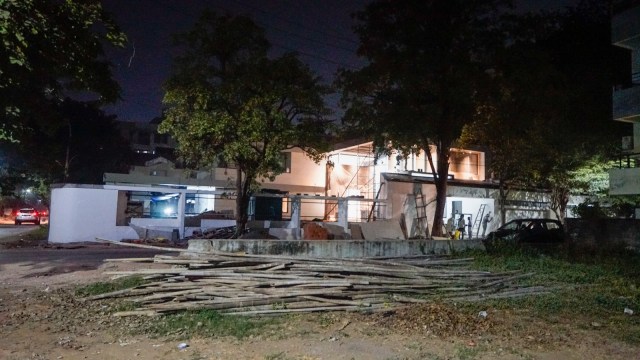Disturbed Areas Act: Gujarat HC dismisses neighbours’ interference in sale of bungalow to Muslim, says Act only to see if it’s distress sale
The court of Justice Vaibhavi Nanavati, while dismissing the plea as being devoid of merits in an order dated October 11, has observed that third parties such as neighbours are “not required to be heard”. The order was made public recently.
 Photo of the Kesarbaug bungalow, the sale of which was upheld by the Gujarat High Court under the Disturbed Areas Act (Express Photo By Bhupendra Rana)
Photo of the Kesarbaug bungalow, the sale of which was upheld by the Gujarat High Court under the Disturbed Areas Act (Express Photo By Bhupendra Rana) The Gujarat High Court has dismissed a plea objecting to the transfer of a property in Vadodara from a Hindu to a Muslim. The plea, moved by five neighbours who reside in the vicinity of the property, had sought cancellation of the deputy collector’s order permitting registration of a sale deed between the buyer and the seller under the Disturbed Areas Act.
The court of Justice Vaibhavi Nanavati, while dismissing the plea as being devoid of merits in an order dated October 11, has observed that third parties such as neighbours are “not required to be heard”. The order was made public recently.
Five residents of Kesarbaugh Society in Vadodara – Dr Harshil Shah, Harsh Rana, Ankur Agrawal, Santosh Ramandana, Girish Pathak – had opposed the transaction “on communal ground”.
The dispute arose when businesswoman Geeta Goradia sold her bungalow – located at Kesarbaugh Society on Vasna Tandalja road – to businessman and educationalist Faizal Fazlani for Rs 6 crore in August 2019 with the deputy collector’s approval.
The transaction, based on fair price and free will, was objected to by members of the residential society, based on the Disturbed Areas Act that does not permit the sale of a property to a Muslim in a Hindu-dominated area and vice versa until each immediate neighbour of the property agrees to the deal.
The HC order noted that authorities, while considering such transfer of property under the Disturbed Areas Act, have to decide if it is a distress sale and not whether it will create any law and order problem.
The court said: “Once the sale is held to be bonafide, no interference is called for to exercise extraordinary jurisdiction under Article -226 of the Constitution of India. Sections 4 and 5 of the Act provide that when the question of either giving post-facto sanction to such sale or a permission to sale is concerned, the collector is required to consider whether the sale is for a fair consideration and with pre-consent.”
“The object to get into such sale consideration is not to see whether it would create any law and order problem but to decide whether the sale is a distress sale so as to migrate from such an areas by any manner getting away and selling his property for whatever consideration under fear,” it added.
In December 2019, the HC had stepped in to uphold the validity of the property transaction after the special secretary revenue department (SSRD) had held the sale to be non-maintainable, following the registration of the sale deed. The HC had then struck down the SSRD verdict.
In June 2020, Fazlani approached the city survey superintendent to record the names of his and his family members in the property card in pursuance to the registered sale deeds but the application was kept pending. By December 2020, the petitioners also sought permission from Vadodara Municipal Corporation (VMC) to carry out construction work at the bungalow and the same was granted.
However, in June 2021, VMC issued an order under the Gujarat Provincial Municipal Corporation Act, directing a stay on further construction on the plot by Fazlani, citing pending litigation before the HC concerning the property transfer.







